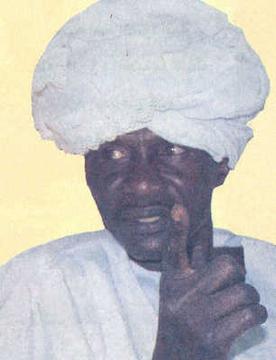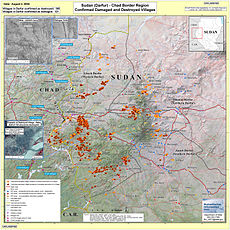
The International Criminal Court (ICC) is an intergovernmental organization and international tribunal seated in The Hague, Netherlands. It is the first and only permanent international court with jurisdiction to prosecute individuals for the international crimes of genocide, crimes against humanity, war crimes, and the crime of aggression. The ICC is distinct from the International Court of Justice, an organ of the United Nations that hears disputes between states. Established in 2002 pursuant to the multilateral Rome Statute, the ICC is considered by its proponents to be a major step toward justice, and an innovation in international law and human rights.

United Nations Security Council Resolution 1564, adopted on 18 September 2004, after recalling resolutions 1502 (2003), 1547 (2004) and 1556 (2004), the Council threatened the imposition of sanctions against Sudan if it failed to comply with its obligations on Darfur, and an international inquiry was established to investigate violations of human rights in the region.

The International Criminal Court has opened investigations in Afghanistan, Bangladesh/Myanmar, Burundi, the Central African Republic (twice), Côte d'Ivoire, Darfur in Sudan, the Democratic Republic of the Congo, Georgia, Kenya, Libya, Mali, Palestine, the Philippines, Uganda, Ukraine, and Venezuela I. The Office of the Prosecutor carried out and closed preliminary investigations in Bolivia; Colombia; Congo II; Gabon; Guinea; Honduras; Iraq/the United Kingdom; registered vessels of Comoros, Greece, and Cambodia; and South Korea. Ongoing preliminary examinations are being carried out in situations in Lithuania/Belarus, Nigeria, and Venezuela II.

The United States is not a state party to the Rome Statute of the International Criminal Court, which founded the International Criminal Court (ICC) in 2002.

The War in Darfur, also nicknamed the Land Cruiser War, was a major armed conflict in the Darfur region of Sudan that began in February 2003 when the Sudan Liberation Movement (SLM) and the Justice and Equality Movement (JEM) rebel groups began fighting against the government of Sudan, which they accused of oppressing Darfur's non-Arab population. The government responded to attacks by carrying out a campaign of ethnic cleansing against Darfur's non-Arabs. This resulted in the death of hundreds of thousands of civilians and the indictment of Sudan's president, Omar al-Bashir, for genocide, war crimes, and crimes against humanity by the International Criminal Court.

The states parties to the Rome Statute of the International Criminal Court are those sovereign states that have ratified, or have otherwise become party to, the Rome Statute. The Rome Statute is the treaty that established the International Criminal Court, an international court that has jurisdiction over certain international crimes, including genocide, crimes against humanity, and war crimes that are committed by nationals of states parties or within the territory of states parties. States parties are legally obligated to co-operate with the Court when it requires, such as in arresting and transferring indicted persons or providing access to evidence and witnesses. States parties are entitled to participate and vote in proceedings of the Assembly of States Parties, which is the Court's governing body. Such proceedings include the election of such officials as judges and the Prosecutor, the approval of the Court's budget, and the adoption of amendments to the Rome Statute.

While there is a consensus in the international community that ethnic groups have been targeted in Darfur and that crimes against humanity have therefore occurred, there has been debate in some quarters about whether genocide has taken place there. In May 2006, the International Commission of Inquiry on Darfur organized by United Nations "concluded that the Government of the Sudan has not pursued a policy of genocide ... [though] international offences such as the crimes against humanity and war crimes that have been committed in Darfur may be more serious and heinous than genocide." Eric Reeves, a researcher and frequent commentator on Darfur, has questioned the methodology of the commission's report.

United Nations Security Council resolution 1591, adopted on 29 March 2005, after recalling resolutions 1547 (2004), 1556 (2004), 1564 (2004), 1574 (2004), 1585 (2005), 1588 (2005) and 1590 (2005) on the situation in Sudan, the council placed a travel ban and asset freeze on those "impeding the peace process" in Darfur.

United Nations Security Council Resolution 1706, adopted on August 31, 2006, after recalling previous resolutions on the situation in Sudan, including resolutions 1556 (2004), 1564 (2005), 1574 (2004), 1590 (2004), 1591 (2005), 1593 (2004), 1663 (2006), 1665 (2006) and 1679 (2006), the Council expanded the mandate of the United Nations Mission in the Sudan (UNMIS) to include deployments in Darfur to enforce the Darfur Peace Agreement.
Ahmed Mohammed Haroun is one of five Sudanese men wanted by the International Criminal Court (ICC) for war crimes and crimes against humanity in Darfur. Despite international pressure on the government of Sudan to surrender him to the ICC, Haroun served as Sudan's Minister of State for Humanitarian Affairs until May 2009, when he was appointed to the governorship of South Kordofan. In September 2007, he was appointed to lead an investigation into human rights violations in Darfur. In July 2013 he resigned as Governor of South Kordofan, and was reappointed by Omar al-Bashir as Governor of North Kordofan. On 1 March 2019, President Omar al-Bashir handed over the running of the country's leading political party, the National Congress, to him. He was arrested in April 2019 by local authorities in Sudan following a coup which overthrew al-Bashir.

Ali Muhammad Ali Abd-Al-Rahman, commonly known as Ali Kushayb, is a senior Janjaweed commander who supported the Sudanese government against Darfur rebel groups during the Omar al-Bashir presidency. He was indicted by the International Criminal Court (ICC) for war crimes. He was known as aqid al oqada and was active in Wadi Salih, West Darfur.
The International Commission of Inquiry on Darfur was established pursuant to United Nations Security Council Resolution 1564 (2004), adopted on 18 September 2004. The resolution, passed under Chapter VII of the United Nations Charter, urged the Secretary-General to set up an international commission to investigate human rights violations committed in Darfur. The following month, the Secretary-General appointed a five-member panel of highly regarded legal experts: chairperson Antonio Cassese, Mohammed Fayek, Hina Jilani, Dumisa Ntsebeza and Thérèse Striggner Scott.
The International Criminal Court's founding treaty, the Rome Statute, provides that individuals or organizations may submit information on crimes within the jurisdiction of the Court. These submissions are referred to as "communications to the International Criminal Court".

United Nations Security Council Resolution 1590, adopted unanimously on 24 March 2005, after recalling resolutions 1547 (2004), 1556 (2004), 1564 (2004), 1574 (2004), 1585 (2005) and 1588 (2005) on the situation in Sudan, the Council established the United Nations Mission in Sudan (UNMIS) for an initial period of six months.
Abdallah Banda Abakaer Nourain, commonly referred to as Abdallah Banda, was the Commander-in-Chief of the Justice and Equality Movement (JEM) Collective-Leadership, one of the components of the United Resistance Front. As of June 2019, he is wanted for trial before the International Criminal Court for three counts of war crimes allegedly committed during the Haskanita raids against African Union peacekeepers within the context of the Darfur conflict in Sudan.
Saleh Mohammed Jerbo Jamus, commonly referred to as Saleh Jerbo, was the Chief-of-Staff of the SLA-Unity. He was indicted by the International Criminal Court to be tried, together with Abdallah Banda, for three counts of war crimes allegedly committed during the Raids on Haskanita against African Union peacekeepers within the context of the Darfur conflict in Sudan. The case against him was dropped without prejudice after his apparent death on 19 April 2013.

United Nations Security Council Resolution 2003, adopted unanimously on July 29, 2011, after reaffirming all previous resolutions and statements on the situation in Sudan, the Council extended the mandate of the African Union – United Nations Hybrid Operation in Darfur (UNAMID) for a further 12 months until July 31, 2012.

The International Criminal Court investigation in Darfur or the situation in Darfur is an ongoing investigation by the International Criminal Court (ICC) into criminal acts committed during the War in Darfur. Although Sudan is not a state party to the Rome Statute, the treaty which created the ICC, the situation in Darfur was referred to the ICC's Prosecutor by the United Nations Security Council in 2005. As of June 2019, five suspects remained under indictment by the court: Ahmed Haroun, Ali Kushayb, Omar al-Bashir, Abdallah Banda and Abdel Rahim Mohammed Hussein. Charges against Bahar Abu Garda were dropped on the basis of insufficient evidence in 2010 and those against Saleh Jerbo were dropped following his death in 2013. In mid-April 2019, Haroun, al-Bashir and Hussein were imprisoned in Sudan as a result of the 2019 Sudanese coup d'état. In early November 2019, the Forces of Freedom and Change (FFC) and Sudanese Prime Minister Abdalla Hamdok stated that al-Bashir would be transferred to the ICC. One of the demands of the displaced people of Darfur visited by Hamdok prior to Hamdok's statement was that "Omar Al Bashir and the other wanted persons" had to be surrendered to the ICC.
United Nations Security Council Resolution 1828 was adopted on 31 July 2008.

The Darfur genocide was the systematic killing of ethnic Darfuri people during the War in Darfur. The genocide, which was carried out against the Fur, Masalit and Zaghawa ethnic groups, led the International Criminal Court (ICC) to indict several people for crimes against humanity, rape, forced transfer and torture. An estimated 200,000 people were killed between 2003 and 2005. Other sources estimate that between 2003 and 2008, the conflict resulted in about 300,000 civilian deaths and about 2.7 million displaced civilians.













